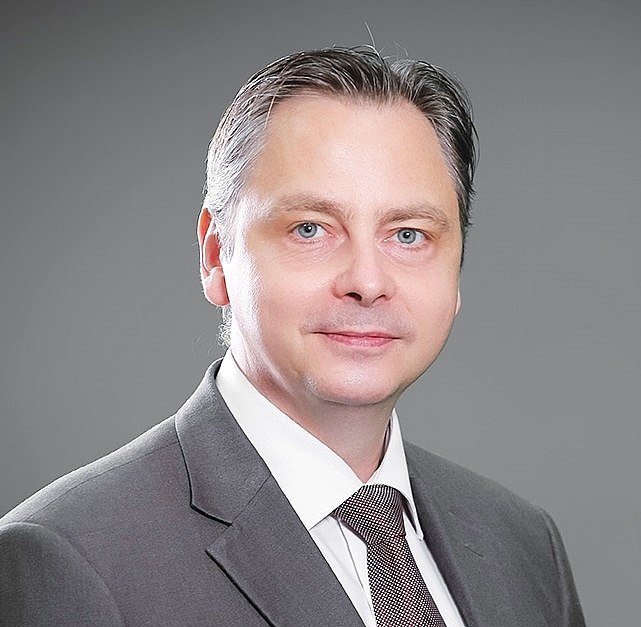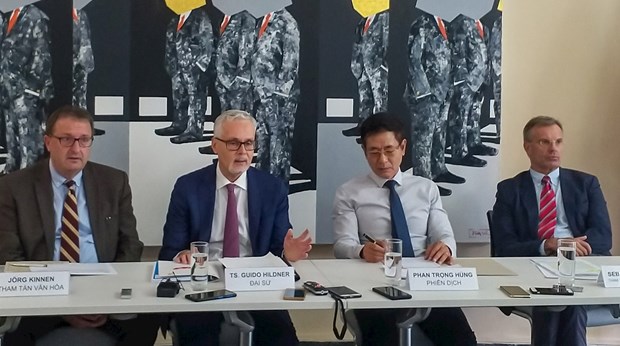AHK Vietnam’s chief representative Marko Walde highlights the contributions made for the significant development of foreign direct investment in Vietnam from Germany.
 |
|
AHK Vietnam’s chief representative Marko Walde
|
AHK, in tandem with the Ministry of Planning and Investment (MPI), has created platforms for authorities and businesses from both Germany and Vietnam to discuss and exchange information and experiences. Through the AHK working groups and roundtables, German investors take part in shaping the work in Vietnam as well as raising their voices and opinions, planning initiatives, and discussing the current situation in Vietnam.
Resolutions and findings are used as a starting point to discuss with policymakers and authorities. AHK Vietnam carries out market-specific conferences and networking events, in collaboration with the MPI or by inviting leaders, representatives, and experts. For companies, these are good opportunities to both strengthen existing contacts and create new ones.
They also have the chance to stay informed about the latest developments in Vietnam. Thanks to that kind of policy dialogue, recommendations and feedback from the German business community in Vietnam on sustainable development, economic policy, and human resources development have been delivered directly to the MPI and related experts.
In collaboration with municipal and provincial departments of planning and investment, German investors are supported in setting up factories in Vietnam. Before the pandemic crept in, AHK Vietnam regularly hosted delegations from Germany. Being part of the AHK member network helps to stay informed and establish contacts with visiting local companies and organisations, as well as researchers and policymakers in Vietnam.
GDP growth for Vietnam in 2020 is projected around 2.8 per cent and, thanks to free trade agreements (FTAs), Vietnam’s GDP is set to increase by up to 3.2 per cent between now and 2030. Vietnam will become a strategic investment destination in the process of restructuring global and regional supply chains and a potential market for international corporations.
In 2020 a series of documents such as amended laws on investment, enterprises, and public-private partnerships were approved to simplify procedures, enhancing decentralisation and transparency, diversifying investment forms, and supplementing special incentives for large-scale projects that meet the requirements and can make significant contributions to socioeconomic development.
Conditions to enjoy
It is obvious that these results show the Vietnamese government has taken decisive and forceful action against the impact of the pandemic. These measures should be taken as fast as possible to counter the economic impact of the coronavirus, in order to bring the economy back onto a growth path as quickly as possible.
Moreover, the Vietnamese government creates the most favourable conditions for foreign investors and businesses, and this commitment will boost the economic growth of this country and attract more investors to Vietnam. Vietnam has been implementing a number of activities and effective methods in order to achieve the dual objectives of promoting socioeconomic development and effectively preventing the pandemic from taking hold.
German businesses expect that the EU-Vietnam FTA (EVFTA) and the EU-Vietnam Investment Protection Agreement will improve economic policy in Vietnam in the long run. Businesses could enjoy protection of investments with trade facilitations and increase investments in Vietnam.
For the mid-term, there will be many investment flows for high-valued projects into Vietnam. German investors would bring their well-known technology in management and training to this country, allowing more value-added production and less waste of material and resources.
There are currently expansion plans for German investors from China to Vietnam. They are complementing their existing Chinese operations with new activities in Vietnam regarding sourcing and investments. This trend had started before the US-China trade conflict as German investors in China were already looking to diversify their operations by adding another location in Asia.
Their concrete reasons for that are their diversification strategies and reliability of Vietnamese partners, as well as rising wage costs in China. And when it comes to alternatives in ASEAN, German investors choose Vietnam first.
Companies that are increasing investment in Vietnam despite pandemic include tesa, which began building a €55 million ($67 million) plant at DEEP C Industrial Zones in the northern city of Haiphong. This manufacturing site will employ about 140 employees and the operation date is slated for 2023.
Areas of focus
As Vietnam gradually resumes economic activities in a new normal environment, business will benefit from foreign high-skilled workers and experts in terms of restoring production, expanding investment, and enhancing expertise when new entry regulations are implemented.
German businesses think that more investors and experts from Germany and the EU will have incentives coming to Vietnam for diplomatic and business purposes, as a result of the Vietnamese government’s commitment to creating the most favourable conditions for foreign investors and businesses to enter Vietnam for a short period, as well as the EVFTA.
In addition to easing entrance for foreigners and based on the current situation of the pandemic worldwide, the Vietnamese government should also consider opening more international flights especially for foreigners and supporting work visas for those who wish to stay and work in Vietnam for a long time. More importantly, the government could support well-organised immigration procedures to facilitate legal entry of investors, managers, technical experts, and diplomats and their family members.
By participating in FTAs like the EVFTA, Vietnam has more opportunities for entering these markets and attracting investments in this country. This will happen through removing tariffs, reducing regulatory barriers and overlapping red tape, ensuring protection of geographical indications, opening up services and public procurement markets, and making sure the agreed rules are enforceable.
New market access opportunities across a range of sectors will also be created thanks to the EVFTA. On the other hand, there will still be challenges for Vietnamese products, in terms of intellectual property rights and protection, as well as global competitiveness and material origins.
Local companies should improve their competitive advantages as soon as possible. Vietnam should adjust policies to speed up the development of the supporting industries by educating high-quality workforce, exchanging experiences, and digitalisation. These are the essential strategies for Vietnam to develop sustainably. VIR

Vietnam-Germany relations develop constantly: Ambassador
Cooperative relations between Vietnam and Germany have been developing constantly in multiple fields, German Ambassador to Vietnam Guido Hildner told the media on September 30.

45 years of Vietnam-Germany relations: Enduring, strong vitality
The relationship between Vietnam and Germany has developed in both depth and breadth, and in an effective manner across all fields despite historical changes, Deputy Prime Minister and Foreign Minister Pham Binh Minh has said.